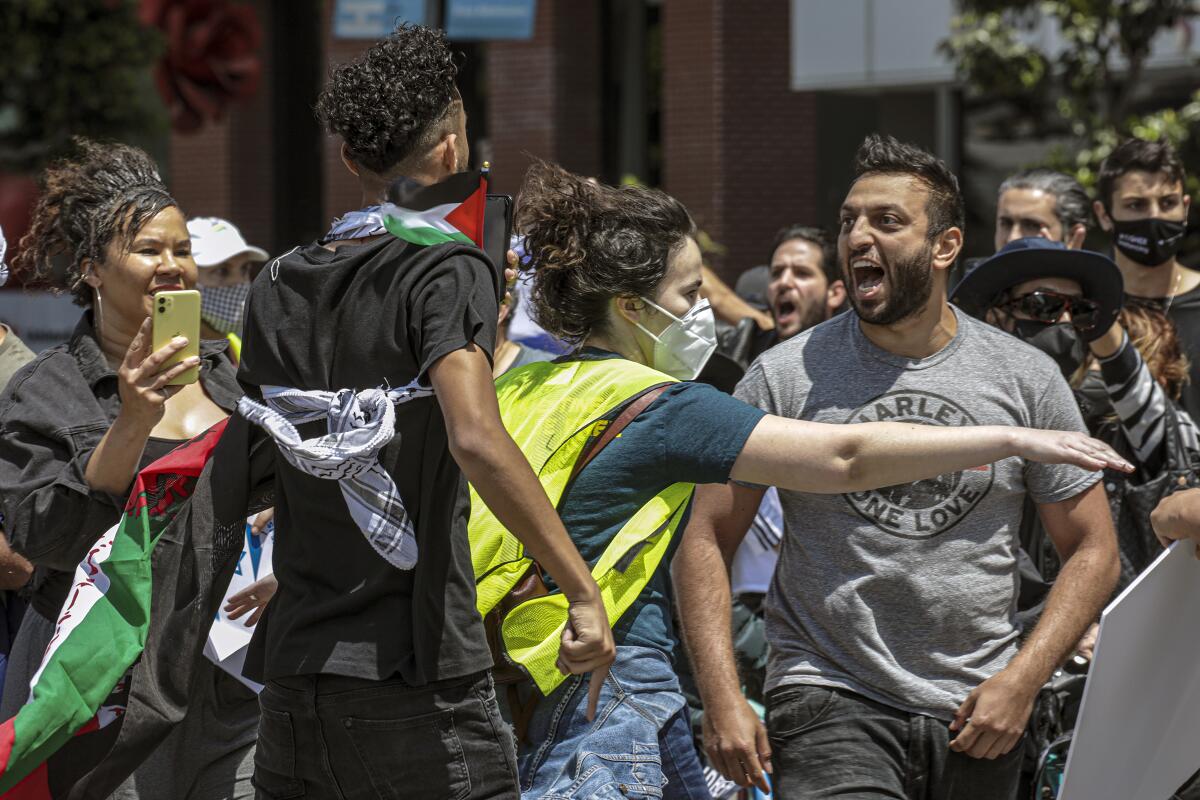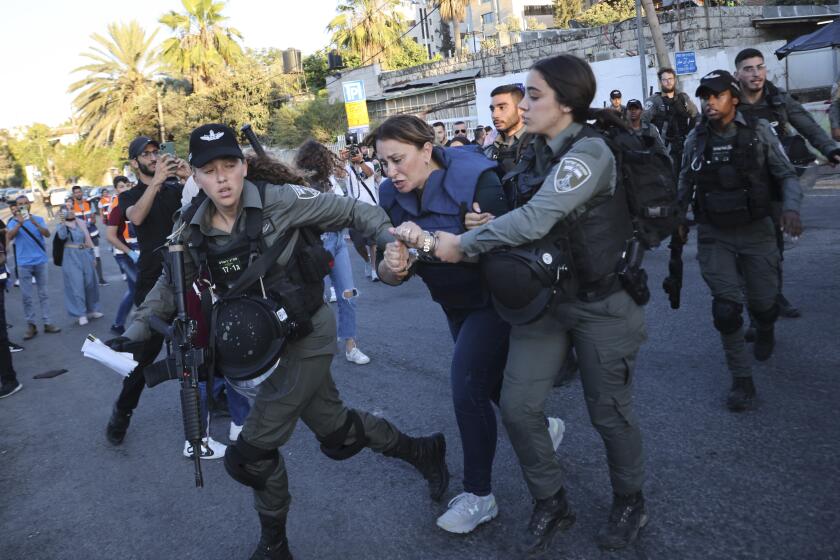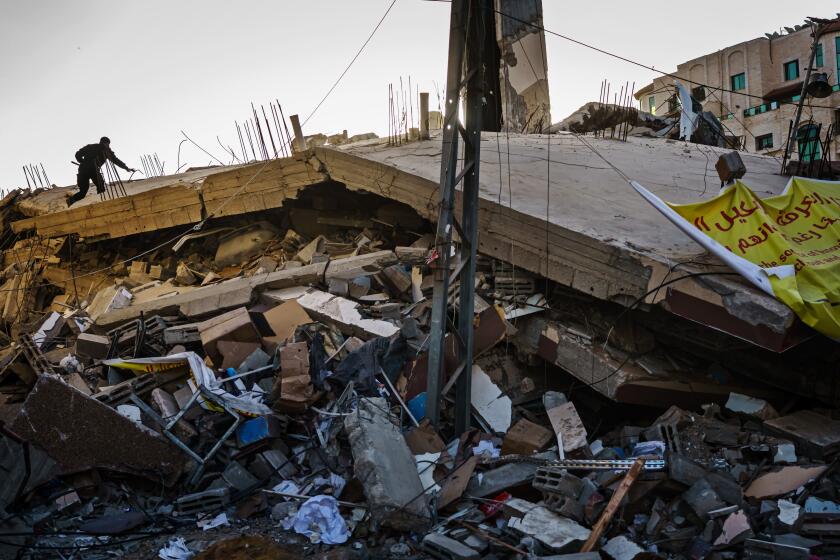L.A. teachers union to vote on urging U.S. to cut aid to Israel, sparking controversy

- Share via
The leadership body of the Los Angeles teachers union is expected to vote in September on a resolution that would urge the U.S. government to end all aid to Israel — a move that has sparked internal debate, drawn praise and scorn from the outside, and diverted some of the union’s focus from post-pandemic education issues.
The declaration, which was brought forward during the recent deadly conflict between Israel and Palestinian militants, urges United Teachers Los Angeles to “express our solidarity with the Palestinian people and call for Israel to end bombardment of Gaza and stop displacement at Sheikh Jarrah” — a site where Palestinian residents face forced removal. In addition to the cutoff in aid, the resolution asks members to endorse “the international campaign for boycotts, divestment, and sanctions against apartheid in Israel.”
Some critics of Israel welcomed the looming vote as an opportunity for the union to take an important stand on an issue of life and death as well as the right of self-determination for Palestinians. Those in opposing camps criticized the resolution as one-sided, insensitive to Jewish students and school employees, and inappropriate for a teachers union — especially as educators confront the challenges of student learning loss and social isolation caused by the pandemic.
The San Francisco teachers union has moved on a faster track, adopting a pro-Palestinian position in May, calling essentially for the same actions.
Taking a page from the Trump playbook, Netanyahu says only ‘fraud’ could lead to his removal as prime minister.
The Los Angeles union leadership has taken no position on the resolution, which included a rationale for adopting the stance.
“As public school educators in the United States,” the resolution states in part, “we have a special responsibility to stand in solidarity with the Palestinian people because of the $3.8 billion annually that the U.S. government gives to Israel, thus directly using our tax dollars to fund apartheid and war crimes.”
The text of the resolution was provided by unofficial sources within the union. The union leadership declined to provide a copy.
The L.A. union resolution was put on the table by teachers at three of the union’s eight area meetings on May 19. Under union rules, a resolution approved at any area meeting would be considered by the highest decision-making body, the House of Representatives, at its next meeting, which is in September.
After the regional Anti-Defamation League sent the union a letter expressing concern, UTLA posted a response.
“Debate and disagreement are essential to democracy and to our union, even when there are deep, conflicting emotions on both sides,” the statement said in part. “As educators, it is our job to create nurturing, safe environments for all of our students. UTLA stands against racism, sexism, anti-Semitism, xenophobia, homophobia, Islamophobia, and oppression in all forms. We stand against both anti-Jewish hate and violence and anti-Arab hate and violence wherever they occur, and we denounce the recent attacks on Jewish people in Los Angeles.”
The resolution passed in the North Area, which includes sections north and east of downtown L.A., and the Harbor Area, in the far south of Los Angeles. It was defeated in the West Area, which includes West L.A. Such area meetings are typically attended by school chapter chairs, but any member in attendance can vote, senior union members said.
The immediate precursor to the teacher activism was the worst violence between Israel and the Palestinian militant group Hamas since 2014, which broke out May 10 and halted with an uneasy cease-fire May 21.
Israeli airstrikes and artillery bombardment killed more than 250 Palestinians in the Gaza Strip, including dozens of children, according to the health ministry. The barrage reduced parts of the impoverished, densely populated enclave — including residential towers, commercial centers, schools, roads and other infrastructure — to rubble. In Israel, 12 people, including two children, were killed as a result of more than 4,000 rockets fired out of Gaza.
Samir Mansour’s bookstore was a cultural magnet for residents of the Gaza Strip until an Israeli airstrike leveled it. Now he has to start over.
Teachers union members pushing forward with the vote believe it is part of their social justice mission.
“Labor unions are inherently anti-imperialist,” said Soni Lloyd, a Venice High School history teacher and chapter chair. In the 1980s, he said, union members spoke out “in response to the humanitarian crisis caused by U.S.-funded war crimes in Central America ... as refugees from these crises poured into L.A. ... in the same way we are now speaking up for the Palestinians.”
“This is not about singling out a specific demographic, it’s about opposing colonization, war crimes and injustice, which are all things that harm the cause of labor,” he said.
The Los Angeles and San Francisco teachers unions are among the state’s most aggressive and influential labor organizations. They held much sway locally over how and when campuses reopened during the pandemic.
Teachers unions have long been active politically, openly taking sides in elections both rhetorically and financially — in some cases providing the primary financial muscle in opposition to corporate interests and wealthy individual donors. UTLA is among the unions that have gone further — such as asserting that when they negotiate a union contract they are “bargaining for the public good.” The union has supported efforts of local families to occupy vacant, government-owned homes and has called for eliminating the L.A. School Police Department, in solidarity with Black Lives Matter activists.
The union resolutions related to the Middle East drew quick and emphatic reactions.
The Jewish Federation of Los Angeles voiced concerns.
“It is inappropriate and unacceptable for UTLA to promote a one-sided position on a complex geopolitical issue that is far removed from the day to day public education in our schools, among our teachers, our students and their families,” the federation said in a statement to The Times. The resolution “knowingly alienates an entire population of their members, and intentionally makes all LAUSD schools feel unwelcome and unsafe for most Jews and their allies.”
The federation also praised teachers within the union who are working to defeat the resolution.
In a statement, the regional Anti-Defamation League, an anti-hate group with Jewish roots, said the resolution “marginalizes those who disagree with it, including many Jewish and Israeli-American staff, students and families. With the recent rise in antisemitic hate crimes and speech around the world, including here in Los Angeles, we would hope that the focus of UTLA remains with the well-being of their staff, students, friends, and neighbors.”
The Jewish community also includes groups that are sharply critical of Israel’s policies and supportive of the union resolutions.
A spokesperson for the L.A. chapter of the Palestinian Youth Movement called the union effort “historic.”
“The second-largest teachers union in the country is on the path towards making a clear, decisive moral stance against Israel’s ethnic cleansing of the Palestinian people…. In doing so, UTLA members add their voices to the growing tide of public support for Palestinian liberation.”
Palestinian supporters liken their activism to the ultimately successful struggle against apartheid South Africa, where the Black majority was long denied political power.
“This is the least we can do, honestly, to educate on this very peaceful way to protest what’s happening in Palestine,” said Amani Barakat, a local leader in the group Al-Awda: The Palestine Right to Return Coalition. “Boycott, divestment and sanction is the peaceful solution to try to deal with this oppression and occupation that’s been going on for 73 years.”
The contention marks a detour from issues that have been preoccupying educators and families, namely, dealing with the pandemic and the resulting yearlong closure of campuses as well as the gradual return to a normal schedule and academic recovery.
“I understand that this is a political hot topic,” said one Westside Jewish parent, who asked not to be named because of recent antisemitic incidents. “I don’t know why it’s relevant to the union. It has nothing to do with educating kids. I don’t think it benefits kids.”
Those siding with Palestinians insist that their advocacy is inseparable from what they see as a more balanced education related to world affairs.
The resolution seems unlikely to affect classroom lessons. The Holocaust — the systematic genocide of Jews and other minority groups in Europe by Adolf Hitler’s German government in World War II — remains part of the curriculum in California. Issues related to Palestinians — a rarer classroom topic historically — may find voice in ethnic studies classes, where Palestinians are included in the state’s new model curriculum.
Nonetheless, some district parents are adding the proposed resolution, which they described as antisemitic, to a list of recent grievances that include the union’s successful efforts to delay the reopening of campuses until after all teachers had the opportunity to be immunized against COVID-19. State and local health authorities said the delay was not essential to keeping campuses safe.
These parents, who have organized under the name California Students United, also were angered when UTLA President Cecily Myart-Cruz likened their desire to reopen campuses to the exercise of “white privilege.” Leaders of the group also criticized the union for “racially profiling” people in a spring report the union undertook, which accused The Times of giving disproportionate coverage to those who wanted campuses to reopen sooner.
The district enrollment of 465,000 students in kindergarten through 12th grade is about 74% Latino, 10% white, 8% Black and 4% Asian.
When campuses reopened in April, the vast majority of students did not return for various reasons. Many cited their lingering fears of COVID-19, which disproportionally hit low-income Latino and Black neighborhoods, safety concerns at reopened campuses and dissatisfaction with the on-campus program being offered.
More to Read
Sign up for Essential California
The most important California stories and recommendations in your inbox every morning.
You may occasionally receive promotional content from the Los Angeles Times.













